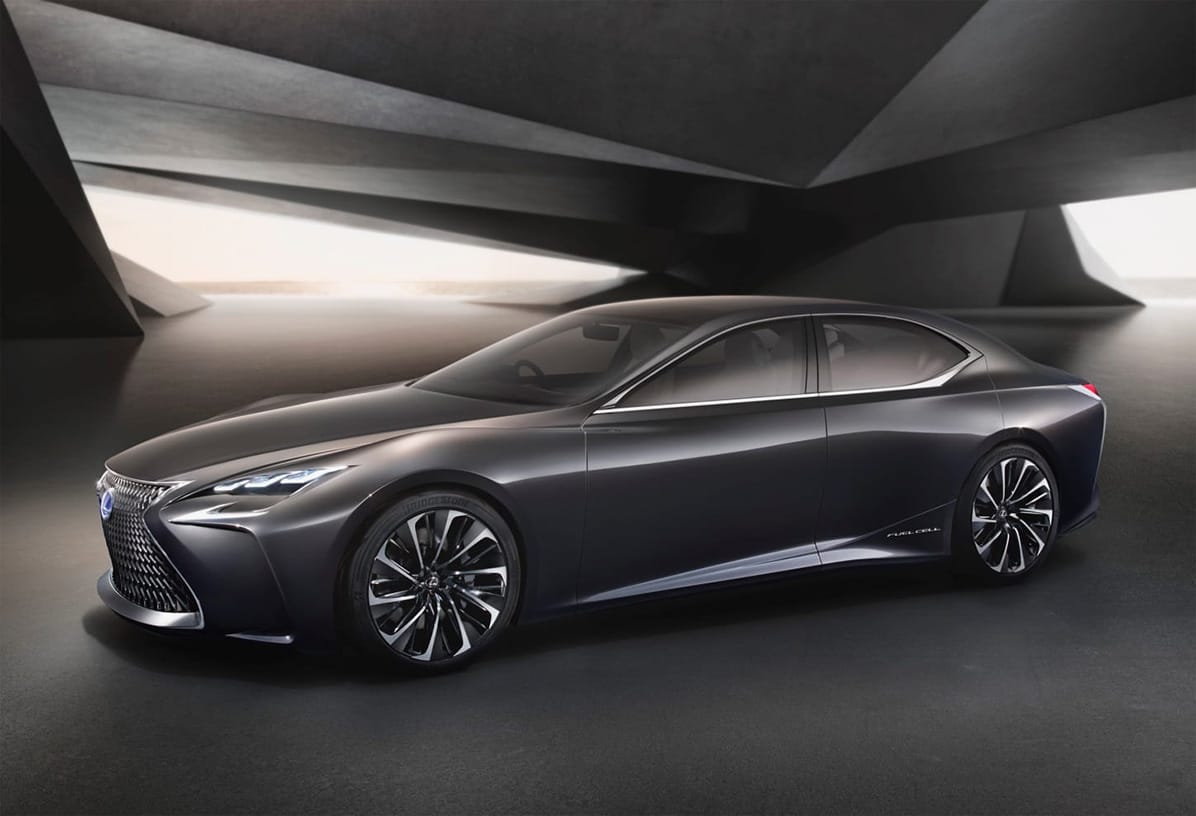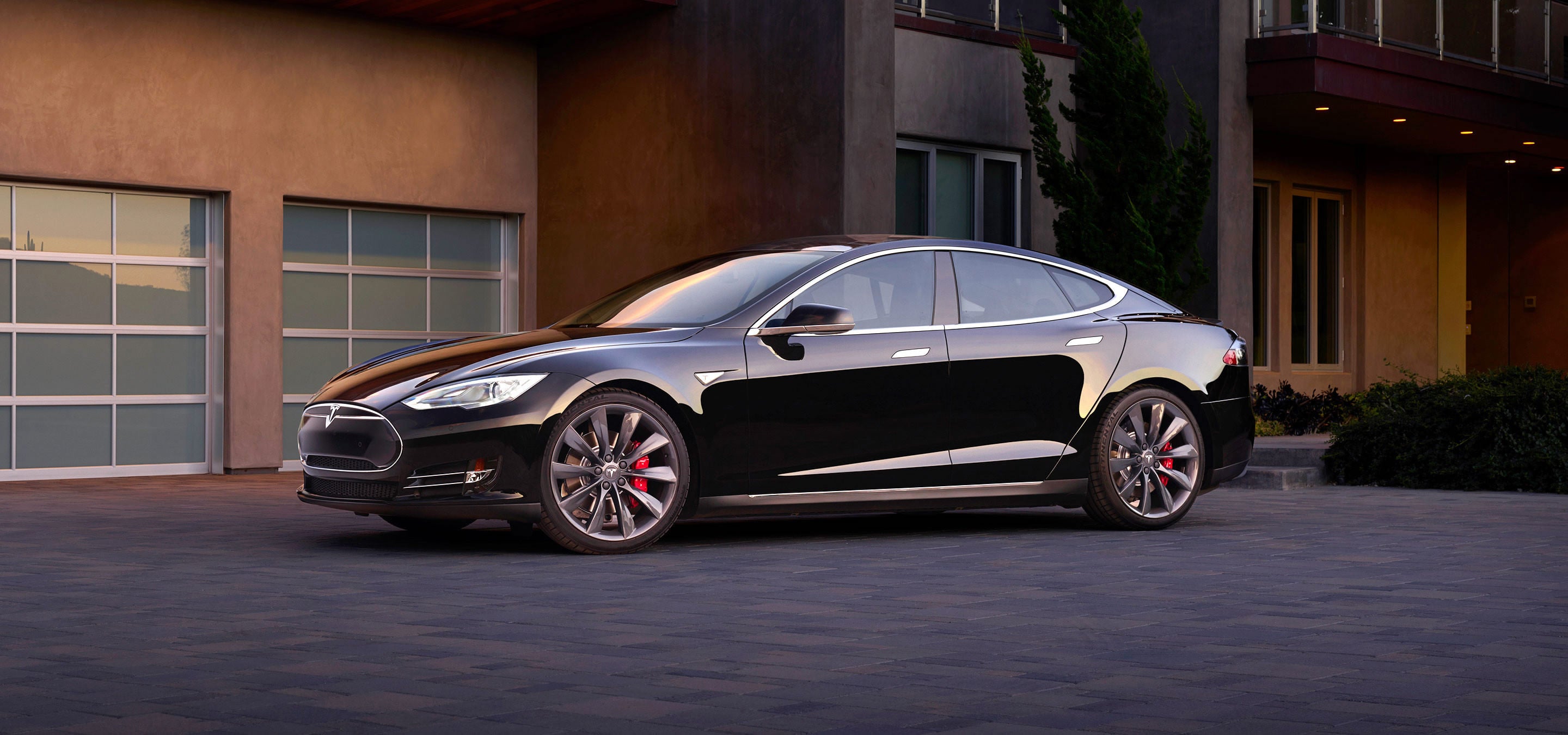 "JR1" (type35bugatti)
"JR1" (type35bugatti)
10/28/2015 at 12:17 ē Filed to: hydrogen, electric, tesla, lexus
 0
0
 26
26
 "JR1" (type35bugatti)
"JR1" (type35bugatti)
10/28/2015 at 12:17 ē Filed to: hydrogen, electric, tesla, lexus |  0 0
|  26 26 |

It is the 21st century people. The age of the internal combustion engine is coming to an end and so is the age of driver operated cars (at least that is what the media wants us to believe). But are we really moving to a greener and more efficient future? And which is the better way to go to get to that new future hydrogen or electric power?
Lexus and Toyota would have you believe the answer lies with hydrogen powered cars. ďThe most abundant element in the universeĒ is the catch phrase Toyota keeps pushing and wants you to believe. And while it is true that hydrogen is the most abundant resource in the universe we still have to figure out how to harness this infinite power.
The answer lies with !!!error: Indecipherable SUB-paragraph formatting!!! . In summation electrolysis sends a plus of electricity through water separating water or H2O into H2 and O2. The electricity to separate this compound must come from somewhere. And like most electricity the answer is likely that it will come from coal or natural gas. So while a hydrogen powered car might indeed be efficient the source from which the car receives the hydrogen will still be inefficient for the foreseeable future.

So perhaps then the future doesnít lie with Lexus and hydrogen but instead we should look to Tesla with their lithium ion powered electric cars? A few issues arise when we look to Tesla however with their lithium ion powered solution. The first issue is obvious. Electric powered vehicles still run mainly off of a !!!error: Indecipherable SUB-paragraph formatting!!! .
Another problem arises as well when we look to lithium ion powered cars to save the world. Exactly how much lithium is left for the world to use? The answer is enough for our current generation. Estimates suggest however !!!error: Indecipherable SUB-paragraph formatting!!! the Earth will no longer be able to support the demand. Therefore we will have a similar problem to the gas crisis that currently grips the world.
There is no perfect solution to making the world green and efficient. A combination of cleaner energy and better resource management is needed to solve the issues our society currently faces.
If this author had to choose a solution today for a greener more Earth friendly car I would lean more towards hydrogen than electric. But you never know what the future holds.
Photo Credits:
 My citroen won't start
> JR1
My citroen won't start
> JR1
10/28/2015 at 12:20 |
|
V12 is better.
 JR1
> My citroen won't start
JR1
> My citroen won't start
10/28/2015 at 12:20 |
|
Obvious statement is obvious.
 SidewaysOnDirt still misses Bowie
> JR1
SidewaysOnDirt still misses Bowie
> JR1
10/28/2015 at 12:21 |
|
I prefer hydrocarbons.
 EL_ULY
> JR1
EL_ULY
> JR1
10/28/2015 at 12:24 |
|
Hydrogen as the economy cars
Hydrogen + Electric for the higher end segment.
Pure Electric could be reserved for performance cars
Petrol/Hybrids for Supercars/Full racecars
 JR1
> SidewaysOnDirt still misses Bowie
JR1
> SidewaysOnDirt still misses Bowie
10/28/2015 at 12:25 |
|
Donít we all?
 JR1
> EL_ULY
JR1
> EL_ULY
10/28/2015 at 12:25 |
|
I like your style!
 RamblinRover Luxury-Yacht
> JR1
RamblinRover Luxury-Yacht
> JR1
10/28/2015 at 12:27 |
|
There used to be a guy on the front page and occasionally here (ďzekestoneĒ? something like that) who would absolutely flip out on the topic, to the point he had it in his name (something like ďhydrogen isnít the futureĒ). Anyway, batteries suck, hydrogen sucks, both are getting better, but neither are the panacea for being able to rebottle grid power. Yet. Thereís probably more potential for improved energy density (at least in volume) in batteries at this point. You know whatís got really great energy density? Gasoline or diesel. Itís a pity algae/etc. biofuel generation is mostly falling on its face lately in terms of energy in/energy out, though. At least you can (in theory) make an electric farm/growing vat/whatever - thatís one way to turn electricity back around.
 TheHondaBro
> JR1
TheHondaBro
> JR1
10/28/2015 at 12:29 |
|
Theyíre both electric, they just have different power sources. One takes refined hydrogen, the other gets its energy through... well, any number of different sources depending on where you live. Around here it would be hydroelectric.
Battery technology is at a standstill, and is a major bottleneck in battery-equipped electric cars. Developing a hydrogen infrastructure, while costly, would prove to be an effective alternative.
 BigBlock440
> JR1
BigBlock440
> JR1
10/28/2015 at 12:29 |
|
Thatís assuming 100 years from now weíll still be using Lithium based batteries. From Lead-acid to the various Nickle based and now weíre at Lithium based. The chances that Lithium batteries will be the main source for electric cars is slim. Though it very well may be an even rarer element.
 CB
> JR1
CB
> JR1
10/28/2015 at 12:30 |
|
Electric, because people keep smacking me and yelling that Iím going to kill us all when I try smoking in a hydrogen vehicle.
 Smallbear wants a modern Syclone, local Maple Leafs spammer
> JR1
Smallbear wants a modern Syclone, local Maple Leafs spammer
> JR1
10/28/2015 at 12:31 |
|
Hydrogen.
 CalzoneGolem
> JR1
CalzoneGolem
> JR1
10/28/2015 at 12:32 |
|
Iím confused doesnít the hydrogen turn into electricity?
Are we debating the merits of a battery vs a hydrogen fuel cell?
 Mattbob
> JR1
Mattbob
> JR1
10/28/2015 at 12:36 |
|
ďinternal combination engineĒ What?
Also, electric and hydrogen powered cars are really just both electric. A hydrogen fuel cell produces electricity and drives electric motors. The main issues here are energy density, convenience, efficiency(and therefore environmental impact), and safety concerns. Right now, hydrogen fuel cells have more energy density than batteries so it wins there.
Convenience is going towards electric cars with more available infrastructure than hydrogen currently has. With hydrogen you could theoretically fill up faster due to the limits on how fast you can charge a battery, but with Teslaís supercharger stations, that really isnít true anymore.
As far as efficiency goes, at this point I am fairly certain it is more efficient to put electricity directly into a vehicle than to use electricity to create hydrogen, then use this hydrogen to create electricity in the car. Entropy is still a thing, right? So I am pretty sure electric vehicles are more green and efficient here.
As far as safety right now, I canít be sure, but I imagine (all other things being equal) a pressurized tank full of explosive hydrogen is slightly more dangerous than a volatile Li-ion battery in an accident (they each have systems to protect the energy sources, I know).
In summation, electric cars are better in most regards, and with batteries becoming more energy dense, hydrogen will soon lose any advantage it had.
As a disclaimer, I didnít research any of this, but I am pretty sure I didnít say anything blatantly wrong.
 kanadanmajava1
> EL_ULY
kanadanmajava1
> EL_ULY
10/28/2015 at 12:38 |
|
Good that you didnít even propose diesel engines to have any future.
 JR1
> RamblinRover Luxury-Yacht
JR1
> RamblinRover Luxury-Yacht
10/28/2015 at 12:42 |
|
Good point. And if only there was a way to make gasoline completely carbon neutral.
 JR1
> TheHondaBro
JR1
> TheHondaBro
10/28/2015 at 12:43 |
|
That is what I believe too. Hydrogen is more than likely a better route to take. I think like steam and gasoline before it hydrogen and electricity will fight it out until a clear winner is decided.
 JR1
> BigBlock440
JR1
> BigBlock440
10/28/2015 at 12:44 |
|
That is a great point. We might move to something totally different.
 RamblinRover Luxury-Yacht
> JR1
RamblinRover Luxury-Yacht
> JR1
10/28/2015 at 12:44 |
|
Overrated, IMHO. At least at a consumer level.
 JR1
> CalzoneGolem
JR1
> CalzoneGolem
10/28/2015 at 12:46 |
|
Yes and no. We are debating those merits and also the merits of where we get the resources that create a battery and a hydrogen fuel cell. A current battery requires lithium which is semi rare and an exhaustible resource. Hydrogen still has to be separated from something that something requiring fossil fuel to produce the hydrogen put into cars.
 JR1
> Mattbob
JR1
> Mattbob
10/28/2015 at 12:49 |
|
Fair enough. It just bothers me that the source we use to create batteries will be insufficient in 100 years. Granted that could change but we need to be thinking a generation or two in advance when we decide what energy source to use.
 EL_ULY
> kanadanmajava1
EL_ULY
> kanadanmajava1
10/28/2015 at 12:55 |
|
Big commercial vehicles will ALWAYS be diesel in my world.
 wiffleballtony
> JR1
wiffleballtony
> JR1
10/28/2015 at 13:36 |
|
I think relying on rare earth metals for battery construction is becoming dependent on another finite resource. Not the answer.
 Tekamul
> Mattbob
Tekamul
> Mattbob
10/28/2015 at 14:02 |
|
In all of what you said, the only sticking point I would have is in the battery versus hydrogen for charging. There are two unpleasant things about battery charging.
1) Time. Supercharging stations do speed it up quite a bit, but itís still an order of magnitude off from filling a pressurized hydrogen tank.
2) Reuse. Batteries lose capacity. Sure, the materials can be recycled, but thatís additional time and money spent to maintain promised efficacy. Hydrogen atoms are hydrogen atoms.
Definitey, batteries are the better right now solution, but hydrogen is still a future solution worth R&D.
 JR1
> wiffleballtony
JR1
> wiffleballtony
10/28/2015 at 14:09 |
|
I could not agree more
 Mattbob
> Tekamul
Mattbob
> Tekamul
10/28/2015 at 14:58 |
|
1) With evolving battery technology, this is becoming less of an issue. If you look at batteries that combine supercapacitor technology and new li-polymer, or even the advances in carbon nanotubes, superfast charging is a real possibility. What dictates the charging speed of a battery its internal resistance which is dictated by a lot of factors including chemistry and physical design. I am glad you noted the recylcling of batteries though. Most people who talk trash about batteries being bad for the environment donít mention the fact that all hybrid car makes have recycling programs that have extremely high success rates.
2)Hydrogen fuel cell vehicles are not without their parts that wear out as well. The membrane that is used inside the fuel cell can degrade and need changing. Iím just speculating, but I imagine this is a pretty tricky thing to produce.
Again, assuming both of these technologies get most of their shortfalls fixed, you still have the issue of the additional step in the energy path of hydrogen. There is no way to make it as efficient unless you are directly mining hydrogen somehow.
 Mattbob
> JR1
Mattbob
> JR1
10/28/2015 at 15:03 |
|
one thing you have to remember is that battery technology is an incredibly fast changing field. Think about how recent it was that lithium ion batteries even came out, and now they are already on to lithium polymer batteries. I would bet you that we are using something completely different in the next 20 years for batteries. Also remember batteries are not an energy source but an energy storage device. In your post you called electric cars ďlithium-ion powered carsĒ when this isnít really the case. They are electrically powered cars irrespective of the particular battery technology.